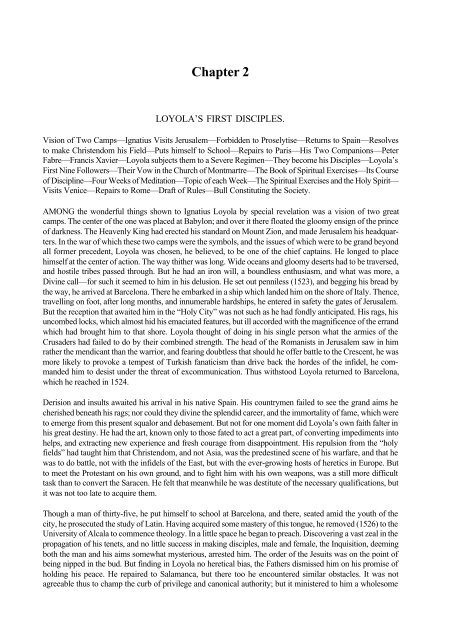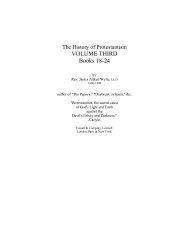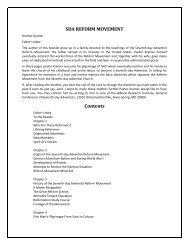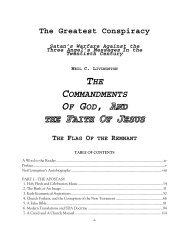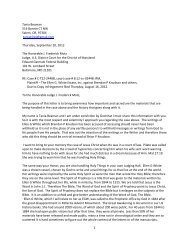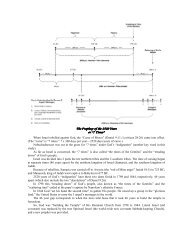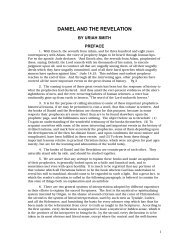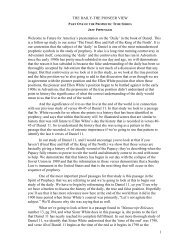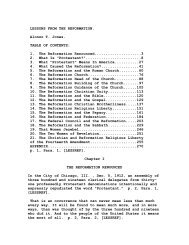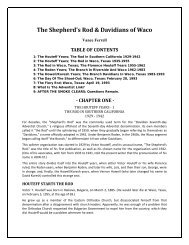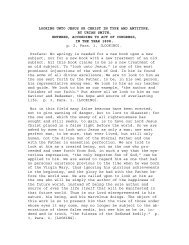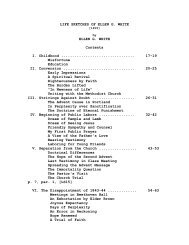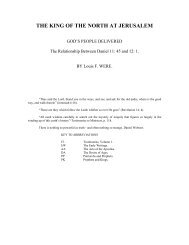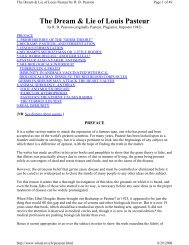History of Jesuits
History of Jesuits
History of Jesuits
You also want an ePaper? Increase the reach of your titles
YUMPU automatically turns print PDFs into web optimized ePapers that Google loves.
Chapter 2<br />
LOYOLA’S FIRST DISCIPLES.<br />
Vision <strong>of</strong> Two Camps—Ignatius Visits Jerusalem—Forbidden to Proselytise—Returns to Spain—Resolves<br />
to make Christendom his Field—Puts himself to School—Repairs to Paris—His Two Companions—Peter<br />
Fabre—Francis Xavier—Loyola subjects them to a Severe Regimen—They become his Disciples—Loyola’s<br />
First Nine Followers—Their Vow in the Church <strong>of</strong> Montmartre—The Book <strong>of</strong> Spiritual Exercises—Its Course<br />
<strong>of</strong> Discipline—Four Weeks <strong>of</strong> Meditation—Topic <strong>of</strong> each Week—The Spiritual Exercises and the Holy Spirit—<br />
Visits Venice—Repairs to Rome—Draft <strong>of</strong> Rules—Bull Constituting the Society.<br />
AMONG the wonderful things shown to Ignatius Loyola by special revelation was a vision <strong>of</strong> two great<br />
camps. The center <strong>of</strong> the one was placed at Babylon; and over it there floated the gloomy ensign <strong>of</strong> the prince<br />
<strong>of</strong> darkness. The Heavenly King had erected his standard on Mount Zion, and made Jerusalem his headquarters.<br />
In the war <strong>of</strong> which these two camps were the symbols, and the issues <strong>of</strong> which were to be grand beyond<br />
all former precedent, Loyola was chosen, he believed, to be one <strong>of</strong> the chief captains. He longed to place<br />
himself at the center <strong>of</strong> action. The way thither was long. Wide oceans and gloomy deserts had to be traversed,<br />
and hostile tribes passed through. But he had an iron will, a boundless enthusiasm, and what was more, a<br />
Divine call—for such it seemed to him in his delusion. He set out penniless (1523), and begging his bread by<br />
the way, he arrived at Barcelona. There he embarked in a ship which landed him on the shore <strong>of</strong> Italy. Thence,<br />
travelling on foot, after long months, and innumerable hardships, he entered in safety the gates <strong>of</strong> Jerusalem.<br />
But the reception that awaited him in the “Holy City” was not such as he had fondly anticipated. His rags, his<br />
uncombed locks, which almost hid his emaciated features, but ill accorded with the magnificence <strong>of</strong> the errand<br />
which had brought him to that shore. Loyola thought <strong>of</strong> doing in his single person what the armies <strong>of</strong> the<br />
Crusaders had failed to do by their combined strength. The head <strong>of</strong> the Romanists in Jerusalem saw in him<br />
rather the mendicant than the warrior, and fearing doubtless that should he <strong>of</strong>fer battle to the Crescent, he was<br />
more likely to provoke a tempest <strong>of</strong> Turkish fanaticism than drive back the hordes <strong>of</strong> the infidel, he commanded<br />
him to desist under the threat <strong>of</strong> excommunication. Thus withstood Loyola returned to Barcelona,<br />
which he reached in 1524.<br />
Derision and insults awaited his arrival in his native Spain. His countrymen failed to see the grand aims he<br />
cherished beneath his rags; nor could they divine the splendid career, and the immortality <strong>of</strong> fame, which were<br />
to emerge from this present squalor and debasement. But not for one moment did Loyola’s own faith falter in<br />
his great destiny. He had the art, known only to those fated to act a great part, <strong>of</strong> converting impediments into<br />
helps, and extracting new experience and fresh courage from disappointment. His repulsion from the “holy<br />
fields” had taught him that Christendom, and not Asia, was the predestined scene <strong>of</strong> his warfare, and that he<br />
was to do battle, not with the infidels <strong>of</strong> the East, but with the ever-growing hosts <strong>of</strong> heretics in Europe. But<br />
to meet the Protestant on his own ground, and to fight him with his own weapons, was a still more difficult<br />
task than to convert the Saracen. He felt that meanwhile he was destitute <strong>of</strong> the necessary qualifications, but<br />
it was not too late to acquire them.<br />
Though a man <strong>of</strong> thirty-five, he put himself to school at Barcelona, and there, seated amid the youth <strong>of</strong> the<br />
city, he prosecuted the study <strong>of</strong> Latin. Having acquired some mastery <strong>of</strong> this tongue, he removed (1526) to the<br />
University <strong>of</strong> Alcala to commence theology. In a little space he began to preach. Discovering a vast zeal in the<br />
propagation <strong>of</strong> his tenets, and no little success in making disciples, male and female, the Inquisition, deeming<br />
both the man and his aims somewhat mysterious, arrested him. The order <strong>of</strong> the <strong>Jesuits</strong> was on the point <strong>of</strong><br />
being nipped in the bud. But finding in Loyola no heretical bias, the Fathers dismissed him on his promise <strong>of</strong><br />
holding his peace. He repaired to Salamanca, but there too he encountered similar obstacles. It was not<br />
agreeable thus to champ the curb <strong>of</strong> privilege and canonical authority; but it ministered to him a wholesome


